
Outdoor reception courtyard with white light decor, at The Elegant Barn wedding venue during a wedding. (Photo by BluBirds Photography)
Couples, small businesses adjust as Arizona wedding costs top $25,000 mark
Anna Furrey | Cronkite News
Dec. 28, 2017
PHOENIX — As wedding prices rise in the Valley, Arizona couples and small businesses juggle costs, trends and constantly evolving technology.
National average wedding costs have risen $12,333 from only five years ago, as millennial couples demand a custom tailored experience, shift from short videos to movies that tell the story of their romance and extend the marriage experience from engagement to wedding day.
According to The Knot 2016 Survey released in February, the cost of a wedding in Arizona averaged $25,718. That actually makes the state the seventh-most affordable place to get married, as the national average that hit an all-time high at $35,329, excluding the honeymoon.
The average wedding cost in Phoenix was $29,621 and in Tucson, $22,175, and while these prices are lower than the national number, wedding costs continue to rise, trends are subject to change and technology continues to evolve, altering the industry and the planning process.
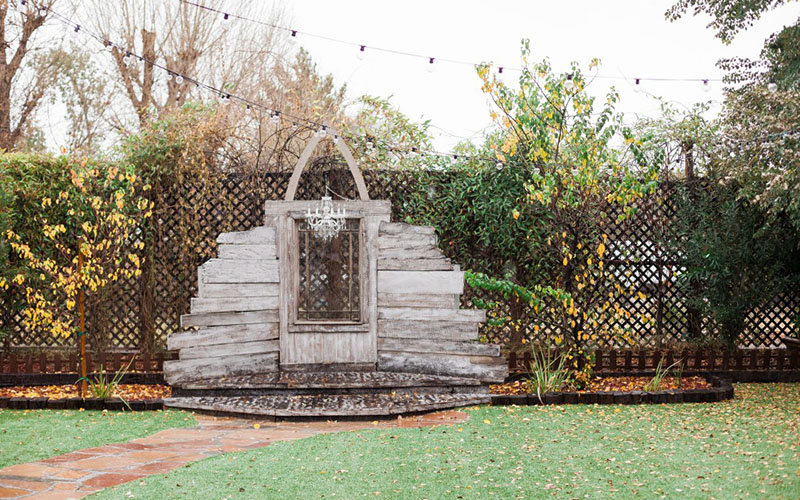
Ceremony backdrop provided by wedding venue, The Elegant Barn. (Photo by April Maura Photography)
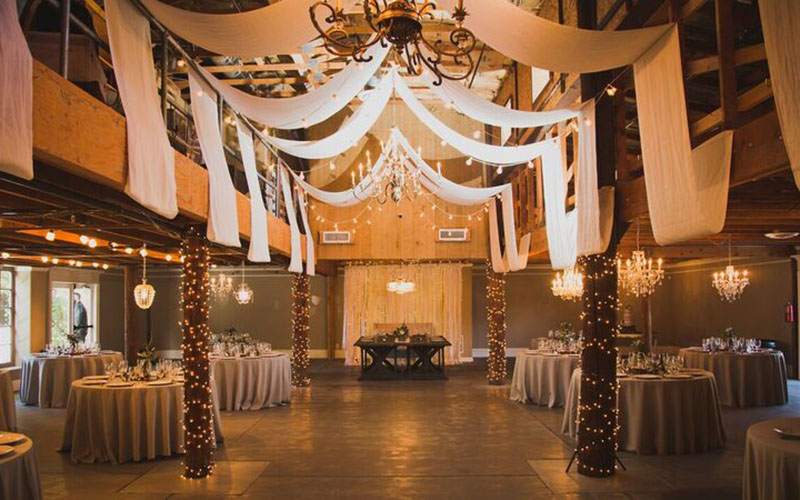
Indoor reception area provided by The Elegant Bar. (Photo by Bryan Black Photography)
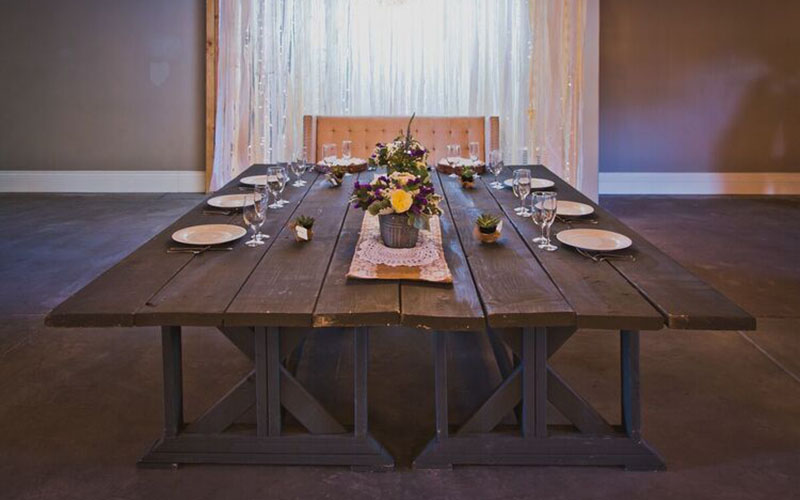
Table, table settings and decorations provided by The Elegant Barn. (Photo by Bryan Black Photography)
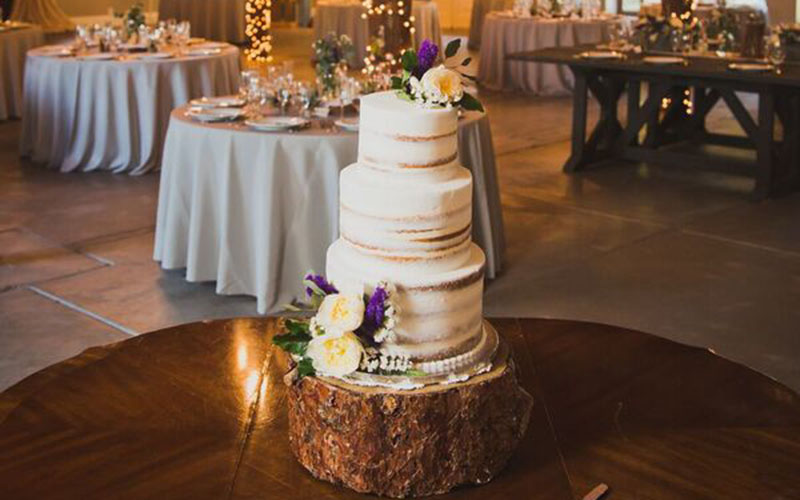
Indoor reception area at The Elegant Barn wedding day ready. (Photo by Bryan Black Photography)
Wedding Costs
Angela Kowal, an Arizona bride from Cottonwood, didn’t spend nearly that much for her wedding in 2009.
“I believe people are missing the point of a wedding. In weddings today, it looks more like a competition of who has the better dress or who has the best wedding theme,” Kowal said. “There’s so much stress, and people go into debt just to celebrate one day. I am not against big weddings, I just see a lot of couples do more than what they can afford.”
Kowal and her cousin/bridesmaid, Chemin Alldredge, spent about $500 on the ceremony and receptions after donations from family and friends.
“At first we wanted a courthouse wedding because we didn’t want anyone in our families to have the pressure in being part of it,” Kowal said. “I believe that it all came together naturally and willingly. I loved how traditional and simple it was.”
Alldredge said there were 20 to 30 guests, the groom hired an inexpensive caterer, alcohol was provided by the groom’s brother as a gift and the local grocery store made the wedding cake.
“I had the groom buy all clear disposable plates and silverware, then, when it came to the toast, we realized he forgot to buy cups. So we had no cups for the toast or dinner and we had to beg the brother of the groom for his stash,” Alldredge said. “He didn’t want to give them up and finally his dad made him. We toasted the bride and groom with red Solo Cups.”
“Everything was very simple and very D.I.Y., ” Alldredge said. “We hung white Christmas lights on the fencing, used black tablecloths and put tea lights everywhere.”
The ceremony and reception was held on family property. The flowers were purchased from the local grocery store and arranged into bouquets by the wedding party. Photos and videos were taken by all of the wedding guests; professional photography was gifted to the couple by the bride’s cousins.
“I wouldn’t change it at all. It was so perfect. We didn’t expect to get married in such a beautiful location. It was a blessing to us,” Kowal said.
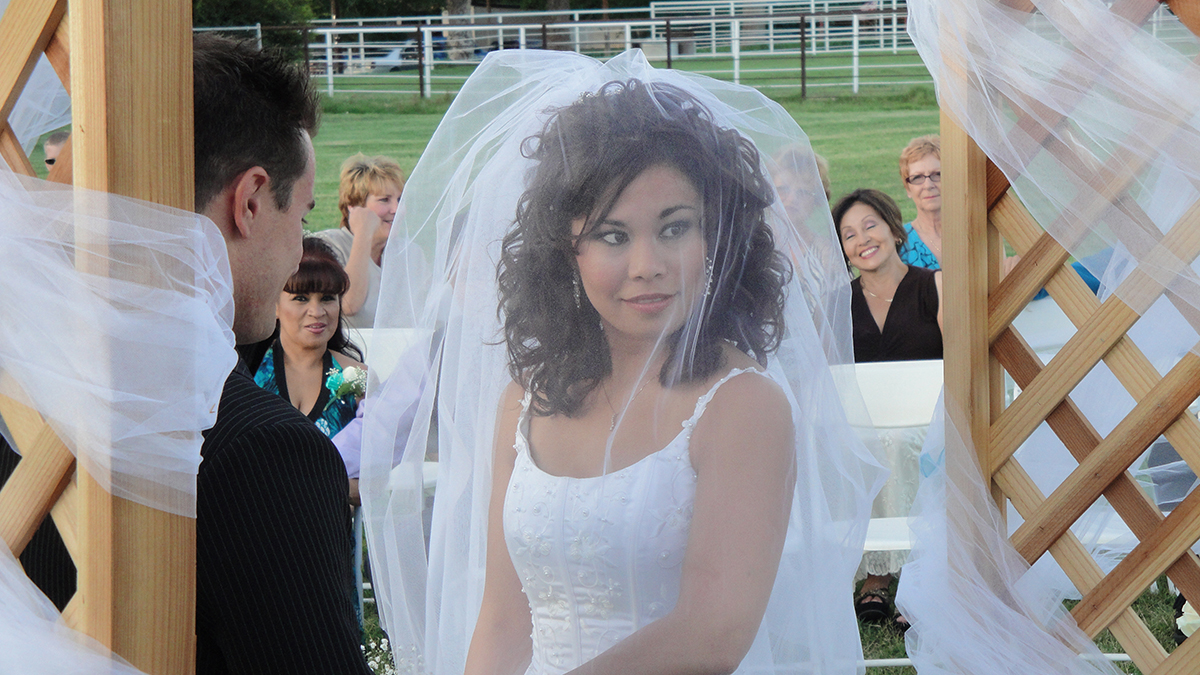
Angela Kowal and now husband Aj Kowal during wedding ceremony in their aunt and uncle’s backyard. (Photo by Caleb Labarda)
Small Businesses in the Wedding Market
When planning a wedding there can be many vendors that come together to create an event. There are different businesses that handle the location, food, cake, bar, photography, cinematography, apparel, cosmetics, decorations, invitations and entertainment. There are even vendors that specialize in coordinating and planning the event itself, all of whom have their own brand, business model and goals.
Arizona wedding planner and florist Skyla Wilson started her business when she was 22 years old.
“I gained my event planning experience through working with nonprofit organizations, planning galas and fundraisers,” Wilson said. “Then, through that, I found that planning weddings, and working with two people on the most special day of their lives was more fulfilling for me.”
Wilson said her market demographic appeals to customers between the ages of 25 to 32.
“I think that I tend to work with younger clients because of how young I am,” she said. “When it comes to florals, wedding design and style I think that younger couples trust me to know their vision.”
Wilson said couples of the millennial generation prefer to personalize their weddings and add elements that represent who they are as a couple.
“They’re bombarded by trends and inspiration on every social media platform, so when it comes to their own personal experience, they want it to be unique to them,” Wilson said.
Communication Between Vendor and Client in the Wedding Market
Vendors have found technology and social media has made a significant impact on communication and relationships with their clients.
For Wilson’s business, Skyla Brooke’s Weddings and Events, technology has helped her communicate with her clients more thoroughly.
“It’s a platform that allows me to communicate with the couple, their families and even their wedding party simultaneously,” Wilson said. “We can add people to the forum and we are notified whenever any activity occurs. This also keeps me from getting texts and phone calls at all hours every day.”
Other vendors say technology has created a 24/7 industry and can cause delays in the planning process.
“Since everything can be done through a phone in our pockets, it’s human nature to push things to the last minute. I get more calls after hours and more texts on Saturdays and Sundays. The expectation in this industry is that you are available 24 hours a day to the couple,” Meesenburg said.
Micetic and Hammond from The Elegant Barn said they predominantly communicate with their couples via email or text. Pollock from Serendipity said sometimes she won’t actually speak to the couple until the day of the event.
“There’s constant communication and yet my phone never rings. Sometimes I wonder why I even have a business line,” Pollock said.
By contrast, Meesenburg said in her experience, every couple just wants to sit down in person and talk through the details leading up to the wedding.
“Even millennials, they want to come to lunch and go over the final details of their wedding face-to-face. The more complex the service is, the more couples want to meet in person. To the bride it’s a concept of, ‘I see your file, I see your notes. You look so confident. I feel better,'” she said.
However, most vendors agree reviews and especially complaints happen almost purely online.
Social Media in the Wedding Market
“People find a lot of security in hiding behind a computer screen. They can be a lot more vicious, a lot more angry and a lot more mean. Then when you go and call the couple, suddenly they’re saying that it wasn’t that bad and they were just frustrated, when on their review or email, they said that I ruined their wedding.” Pollock said.
“It’s very scary for business owners because reviews are awesome, but at the same time, clients have the opportunity to be the judge and the jury in that situation. If you get a bad review it is impossible to get it removed, even if it’s not true,” she said.
In addition to keeping up with clients and coordinating, vendors need to create a presence on the social media platform, adding an entirely new sector to their business. During The Knot Workshop, an industry event held in Scottsdale this past summer, there were sessions dedicated to social media practices.
Social media, especially platforms like Instagram, act as a marketing strategy for businesses owners where they perform most of their advertising.
“I am able to use social media to showcase my work because my product is video. You can’t demonstrate that in a magazine ad,” Pollock said about advertising for her cinematography businesses.
Social media is also where couples are going to find their vendors, and businesses are finding many couples are planning their wedding almost entirely on their smartphones. Speakers and professionals said at The Knot Workshop, if a couple can’t find some kind of social media presence for a business, they may view it as unreliable or dated.
Technology in the Wedding Market
With social media, smartphones and evolution of technology, vendors have had to adapt and work with their clients accordingly.
For Pollock and her businesses, Serendipity Cinematography and Simply Cinema, she is finding the constant advance in technology to be “equally a blessing and a curse.”
“Technology is constantly moving. It’s really hard because keeping up with that is so expensive. You have to be really careful about the choices you make because I can’t afford to swap out gear every season,” she said.
Pollack’s team consists of 16 cinematographers, seven editors and two assistants. Her businesses provide the equipment required to produce the films.
In order to remain competitive, Pollock focuses on her storytelling skills and the style of her overall brand.
“You have to be able to shoot your films with the equipment that you have, not the equipment you wish you had,” she said.
Pollock explained she prices her services based upon the time, equipment and features that go into the product for the couple.
“My prices have had to go up as a result of the expensive gear, the expensive editing, the expense of cinematographers,” Pollock said. “It takes about two to three hours to prep, which means meeting with the client, answering emails and preparing for the actual day, a minimum of eight hours of shooting on the wedding day, and sometimes over 20 hours of editing.”
Pollock said that’s what couples are mainly paying for, the editing that goes into creating a wedding film. Couples are also paying for the professionalism and experience of Pollock and her team.
“Something that you have to remember is that I do this all day every day. We do about 130 weddings a year. I’ve shot, in 12 years, over 1,600 wedding films,” Pollock said. “We are well equipped to handle any crisis or challenge that may pop up on the wedding day.”
Pollock said during the 2008 recession her cinematography business, Serendipity, had taken off, but she found that couples were having tighter budgets.
“As I was expanding Serendipity, I realized that there was an entire market of couples that didn’t want, or maybe couldn’t afford, all the bells and whistles, but still wanted a wedding video. I created Simply Cinema, so that I could service these couples and accommodate their budgets,” Pollock said.
Owner spun off the Simply Cinema Video business left as a lower cost alternative to Serendipity Video business right.
Wedding Packages and All Inclusive Venues
Providing a package option is a common theme in the wedding industry overall. The Elegant Barn, an estate-style wedding venue located in Mesa, provides several options that allow couples to determine a price point with which they are comfortable.
“The price coincides with the amount of time and the amount of product that is used,” said Andrea Micetic, The Elegant Barn account manager and coordinator. “To simply rent a venue, where they just open the doors to you, is going to cost a lot less than a venue that going to help with the coordination, planning, decorations and catering.”
Downtown Phoenix Sheraton hotel event manager Jocelin Meesenburg said she always recommends couples use a wedding planner for their event.
“Unless one person in the couple has some kind of experience, maybe planning a friend or family member’s wedding, most people have never done this before,” Meesenburg said. “The wedding planner does this every week. They have realistic expectations, they know what to ask about, they know what to give you a heads up on. They are wonderful liaisons, but there is a cost to using them.”
Meesenburg said there are some resorts that require a couple to have a wedding planner because of how useful they can be.
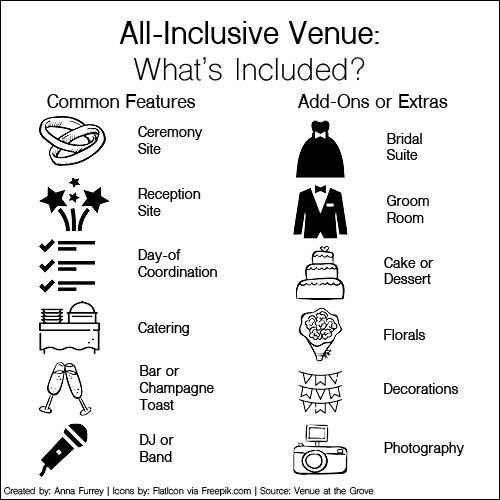
What’s included in an all-inclusive wedding venue? Here’s the breakdown.
Wilson, the wedding planner, said professionals not only help with every facet of the wedding day from before it begins to long after it ends, but they also help in working with other vendors to create a smooth and low-stress experience for the couple.
“The money you put into hiring a wedding planner will almost always be paid back in either time or discounts,” Wilson said. “As a wedding planner, I get discounts at bridal shops, with rental companies and florals. Then, even if a vendor doesn’t offer a discount, they will always throw in something special for the couple.”
It’s common for wedding vendors to have relationships and to refer clients to other local businesses with which they have built rapport.
“When you have a wedding planner helping your hire your vendors you are going to be treated like royalty because that business wants your wedding planner to keep referring couples to them,” Wilson said.
Micetic from The Elegant Barn said all-inclusive venues charge for the services they provide and for the convenience that comes with them.
“When you book with an all-inclusive venue, you almost have everything done the moment you sign,” said Christiana Hammond, the director of operations at The Elegant Barn. “You not only have your space booked, but you will have things like catering, cake, photography, decorations, bar, bride and groom suites to get ready in and day-of coordination all taken care of. The only things left to worry about are the invitations and the dress.”
Micetic said while the cumulative price may look scary upfront, the services and elements of a wedding can quickly increase the price tag.
“By the time you book a venue, and hire a caterer, get a wedding cake, buy the decorations, rent tables, chairs, linens, dishes and flatware, hire a bartender, buy the alcohol and take care of all the little details, it’s going to add up anyway and you just put in three times the work,” Micetic said.
As a wedding planner, Wilson said one main point of advice she would give to couples looking to get married in the future is to create a list of priorities.
“Making a list will help keep you in check,” Wilson said. “Say you fall in love with a gold Chiavari chair that costs $25 each, but then you look at your list as see that “chair rentals” fall at number 17. It forces you to reassess and to remember those 16 other things that were more important than the chairs. It brings you back to what was most important to you in the very beginning.”
Local vendors suggest for couples to simply know their priorities and their budget as a means of saving money when wedding planning.
“It’s easy to want the best of everything when you’re planning your wedding,” Wilson said, “but if you have the best of everything in every single category you’re going to end up with a six-figure wedding. Allow your priorities to shine.”
Saving Money on Wedding Venues
Having a less-popular weekday wedding is one way to receive discounts on wedding services. Booking an Arizona venue from the “off-season” months of June to August can result in lower rates because of the extreme heat.
“If you want to do a brunch wedding, that’s a different price point. You want to have a lunch wedding on a Tuesday, that’s going to be a different price point,” said Meesenburg from the Sheraton. “Whenever the weather is hot in Phoenix, think about having your wedding then. In July and August, you’re going to get the best rates no matter where you go.”
Meesenburg said a couple looking for a hotel venue should research to see about discounted and prime dates. Certain hotels will be geared more toward conferences, so their busy days will be different than a resort that focuses more on vacation and leisure.
Saving Money on Wedding Flowers
Flowers are another wedding element where prices are affected by timing. Carly Hansen, a florist apprentice in the Phoenix area, said one of the best things a couple can do is get flowers that are in season and to work with florists who get their flowers locally.
“When your florist buys flowers and plants locally, you cut a lot of shipping and handling costs, which is where it gets expensive,” Hansen said.
Hansen also suggested that couples use foliage, which is greenery or plant leaves, and filler flowers such as baby’s breath or carnations.
“The specialty flowers, like peonies, can cost up to $12 a stem,” Hansen said. “Adding two or three of those can double the price of your bouquet.”
*Insert floral photo left aligned *
Couples can also reuse floral decor from the ceremony to the reception. Hansen said succulents are popular desert plant and can be repurposed, saving both the florist and the couple money.
“You have to trust the designer. Your florist works with the plants every day, they know what stems will compliment each other and how to make foliage look beautiful,” Hanson said.
Florist and wedding planner Wilson suggests couples browse the portfolios of florist who catch their interest, as opposed to price shopping and gathering quotes.
“When researching different florists, you aren’t looking at different prices for the same product,” Wilson said. “One florist’s ‘peony and rose bouquet’ may include six peonies and twelve roses with embellishments, while another ‘peony and rose’ bouquet may contain three peonies, five roses a ton of foliage. You’re not comparing apples to apples, you’re comparing apples to oranges to lemons to limes.”
Saving Money on Wedding Gowns
From florals to formal wear, there are many ways Arizona couples are saving money on their wedding. In the Phoenix area, there are stores that sell bridal gowns via consignment as well as off-the-rack — either discontinued or manufacturer’s overstock — for a discounted price.
Bridal shops that order gowns through the designers may offer the option to buy a floor or discontinued model at a discounted price or through a sample sale.
Whether a customer reorders a gown or buys it off-the-rack, alterations may still be necessary. Bridal gowns are commonly made in a larger size with the expectation it will be altered to fit.
Alterations for bridal gowns typically run between $200-$550 according to several bridal stores in the surrounding Phoenix area.
“Alterations range so vastly in price because every dress and every bride will be different,” said bridal seamstress Kathy Stephenson. “It wouldn’t be fair to charge a bride who has a very simple gown that nearly fits perfectly the same price as a bride who has a gown that is very intricate and doesn’t fit correctly at all.”
Stephenson said the alterations process can get complicated because she encourages brides to choose the gown they want, and doesn’t want them to feel “punished” for loving the gown they chose.
“That’s where I feel forced to almost undercharge,” Stephenson said. “Sewing is a specialized skill that takes a lot of time. I have to be very strategic and careful with my pricing, then hope that it balances out.”
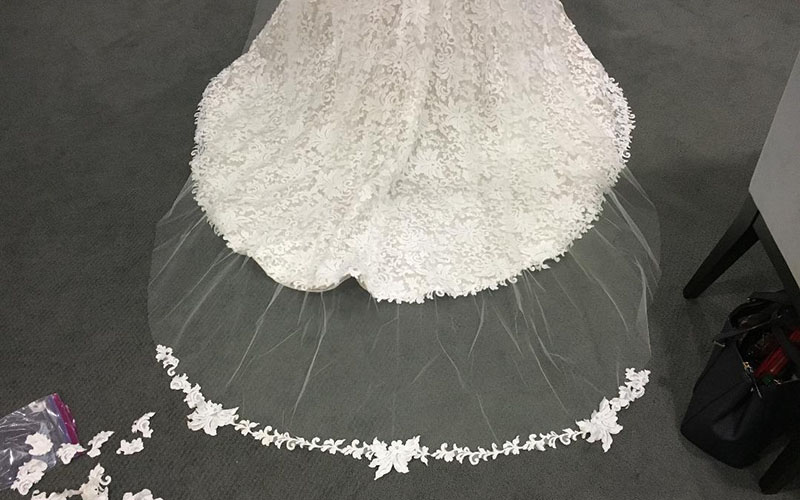
Extra lace fabric from the wedding gown sewn on to the edge of a veil. (Photo by Kathy Stephenson)
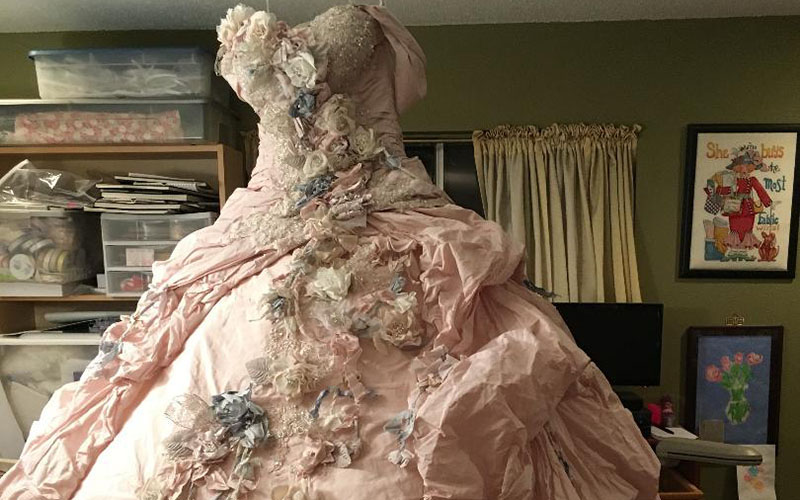
Wedding gown in the process of being altered by seamstress Kathy Stephenson. (Photo by Kathy Stephenson)
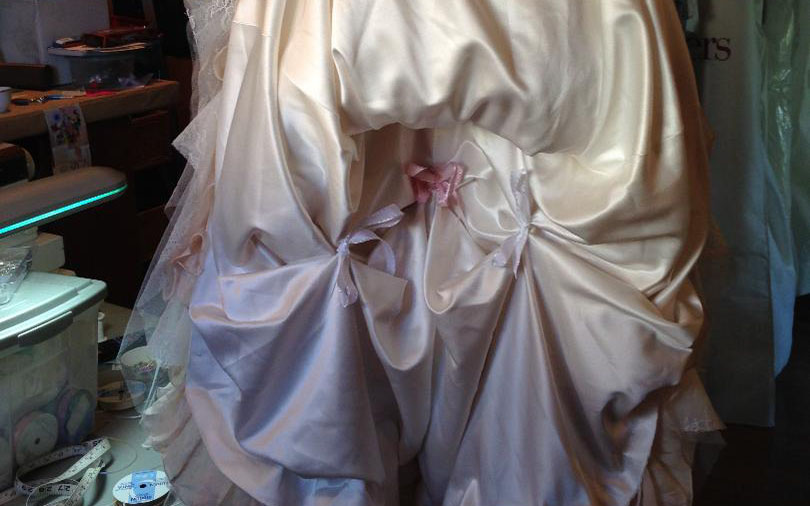
Ribbon tie bustle sewn into a wedding dress by seamstress Kathy Stephenson. (Photo by Kathy Stephenson)
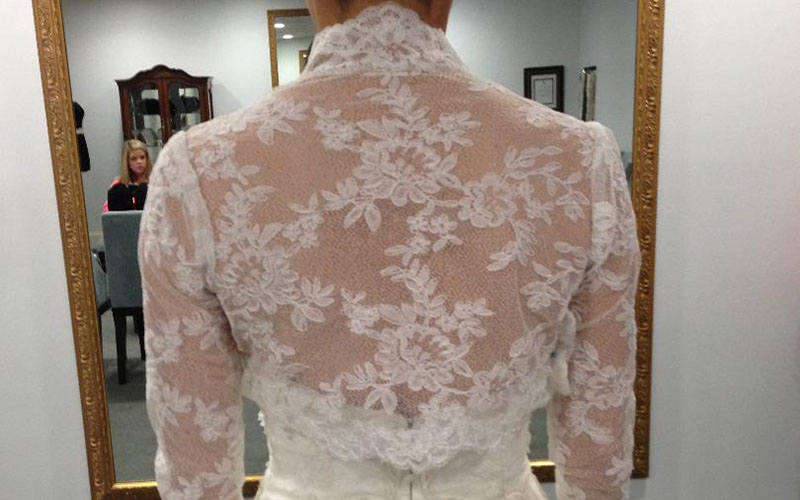
Lace belero to go over wedding dress in order to cover the showers and provide warmth. Created by seamstress Kathy Stephenson. (Photo by Kathy Stephenson)
Millennials and the Wedding Market
Vendors working with their clients are finding differences with the millennial generation regarding communication and technology. However, vendors are saying the core values of a couple remain the same throughout every generation.
“A lot is made about the millennial generation and every other generation. There will be differences because every generation is a little bit different, but above and beyond, they are human beings. We all want to feel special, we all want to feel cared for, listened to. In many ways, working with millennials is the same as working with any other age group,” Meesenburg said. “We want to make sure we are taken care of, that we aren’t taken advantage of and that we get a good value. These things are universal truths for all of us.”
The industry is in a state of change, and the average cost continues to rise by the thousands. As a result, local vendors encourage couples to research their options when determining a budget, choosing the businesses they work with and deciding on the elements for their event.

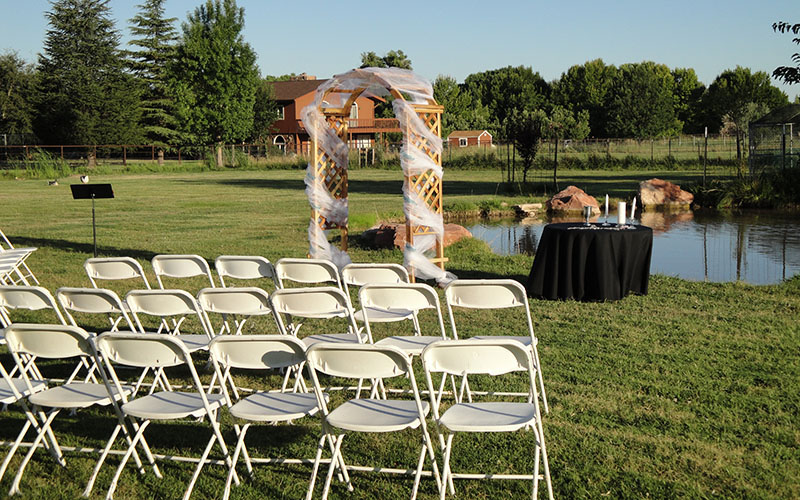
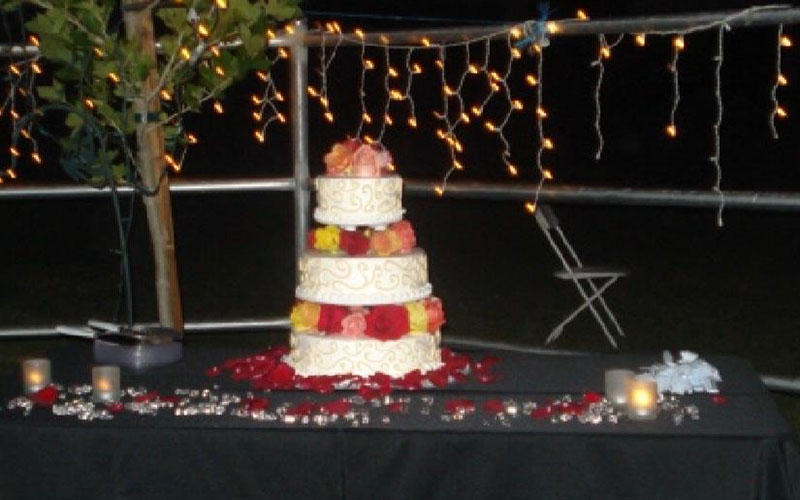
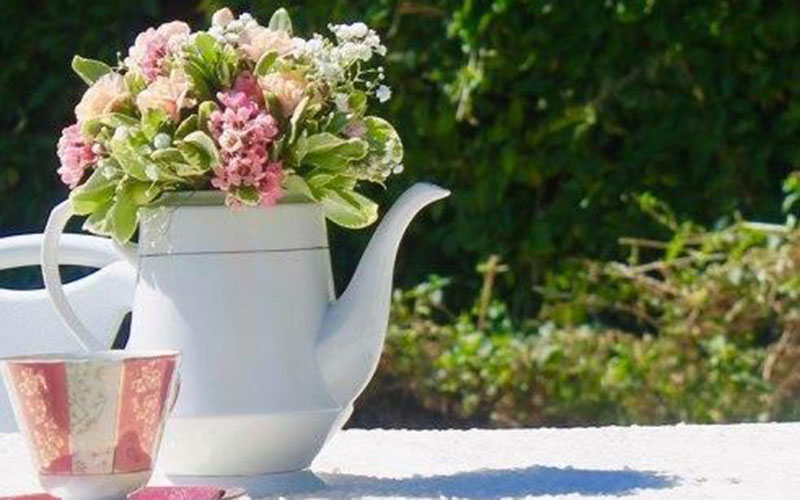
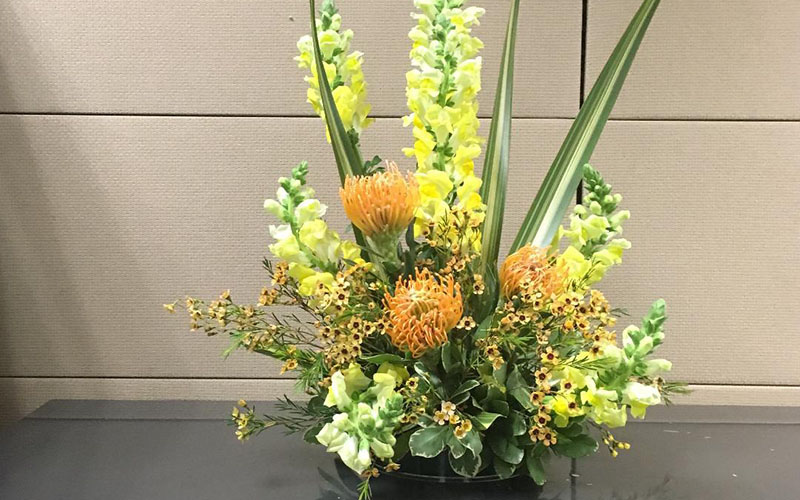
Leave a Comment
[fbcomments]